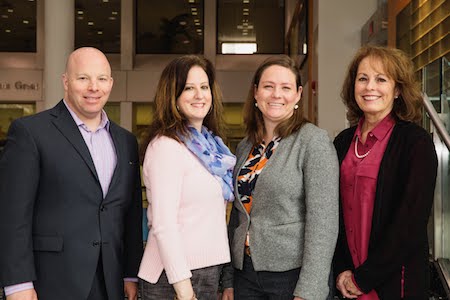This semester, the Fellows wanted to hear more about projects on which the Advising Team has been working in their professional, academic, and personal lives. This was an effort to build our fellowship community with the Advising Team and to learn from their research and passions. The presentations covered various topics and showcased the different strengths and areas of expertise that each advisor offers the program. From Robert, we learned about student leadership and the implications it has for the university and the leaders themselves; from Toby, we learned about elder abuse and her advocacy work in this area; from Kathy, we learned about the problems and promise with evaluation in public policy; and from Mae, we were encouraged to find our “Hedgehog” where passions, strengths, and profit combine. More detailed information about each presentation is included below.
Program director Robert Snyder presented a summary of findings and recommendations from his recently completed doctoral dissertation research on how student leaders navigate power and influence with institutional leaders in higher education settings to achieve their goals and agendas. Robert used French and Raven's bases of social power as the theoretical foundation for his research. In doing so, he found that relationships, knowledge of their constituencies’ priorities, and using information mattered most for student leaders, while coercion and threatening, relying on the title of student leader, and rewards mattered least. Robert’s research sheds light on how student leadership can affect retention and persistence to graduation, encourage self-growth and self-awareness in the leaders themselves, and prepare the students to continue leadership roles in their communities after graduation.
Program coordinator Toby Davidow presented on her advocacy journey and general elder abuse statistics. According to the National Council on Aging, approximately 1 in 10 Americans, who are aged 60 and over, have experienced elder abuse (about 5 million people). Toby personally experienced a 3+ year isolation from her parents by her mother's caregiver. Toby looked to the Kasem Cares Foundation for support. Through the Foundation, she learned that isolation is a major indicator of elder abuse and affected the celebrity families of Casey Kasem, Mickey Rooney, and Glen Campbell. Toby is now partnering with Kerri Kasem (Casey Kasem's daughter), as Ms. Kasem goes state-to-state advocating for a visitation bill that allows families to stay connected to their older loved ones without excessive court appearances. Toby recently provided testimony to the Maryland House of Delegates, which unanimously passed the visitation bill making Maryland the 12th state to turn the Kasem Cares' visitation bill into a law.
Faculty advisor Kathy Newcomer provided an abbreviated version of the keynote speech she delivered atthe 2017 annual conference of the American Evaluation Association in Washington, DC for about 4,000 people. The talk was entitled: From Learning to Action: Employing Evaluation to Advance the Public Good." She described what she feels are the seven key challenges evaluators and analysts face in the public policy space, including: lack of incentives to learn through evaluation; lack of a shared meaning of "evidence;" persisting bias and racism in our institutions; and unpacking complexity. Kathy ended by identifying some promising practices and innovations that the community has developed to address the challenges.
Professional development advisor Mae Cooper shared about her experience volunteering for over 20 years with CISV, an international education organization that helps develop children into future leaders and cultivate global friendships to create peace. She connected her volunteer experiences to how they contributed to her professional development. She also presented the “Hedgehog Model,” which has three components: what you are deeply passionate about, what you can do best in the world, and what drives your resource/economic engine. Mae encouraged the Fellows to think about how various activities they are involved in fit into this model and how to include volunteer activities as part of professional development.


